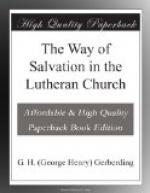Dr. Weiser proceeds: “Many of our churches that fostered this system were in the end injured by it.... Under the revival system it was very natural for the people to become dissatisfied with the ordinary means of Grace. There was a constant longing for excitement, and when the ebullition of feeling abated, many thought they had ’lost their religion.’ The next move was that as the preacher was so dead and lifeless they must get another who had more fire, and thus the old pastor was sent adrift.”
Elsewhere Dr. Weiser has clearly expressed himself as having become firmly convinced that the old churchly method of careful and systematic instruction of the young, is the only sure and safe way of building up the Church. He also quotes Dr. Morris as saying: “The mourners’ bench was introduced into Lutheran churches in imitation of the Methodists, and disorders, such as shouting, clapping of hands, groaning, and singing of choruses of doggerel verses to the most frivolous tunes, whilst ministers or members, and sometimes women, were engaged in speaking to the mourners. Feelings were aroused, as usual, by portraying the horrors of hell, reciting affecting stories, alluding to deaths in families, violent vociferation, and other means. At prayer often all would pray as loud as the leader. These exercises would continue night after night, until the physical energies were exhausted.”
Dr. H.E. Jacobs, in his preface to Rev. G.H. Trabert’s tract on Genuine versus Spurious Revivals, writes thus of the system: “This system, if system it may be called, is in many of its elements simply a reproduction of the Romish errors against which our fathers bore testimony in the days of the Reformation. Wide as is the apparent difference, we find in both the same corruption of the doctrine of justification by faith alone without works, the same ignoring of the depths of natural depravity, the same exaltation of human strength and merit, the same figment of human preparation for God’s Grace, the same confounding of the fruits of faith with the conditions of faith, the same aversion to the careful study of God’s Word, the same indifference to sound doctrine, and the same substitution of subjective frames of mind and forms of experience for the great objective facts of Christianity, as the grounds of God’s favor.
“In both cases, all spiritual strength, which is inseparable from complete dependence solely upon the Word and promise of God, and not in any way upon human sensations and preparations, is either withheld, destroyed, or greatly hindered; and uncertainty and vacillation, despair, infidelity and ruin, often end the sad story of those who are thus left without any firm support amidst the trials of life, and under the strokes of God’s judgments.




